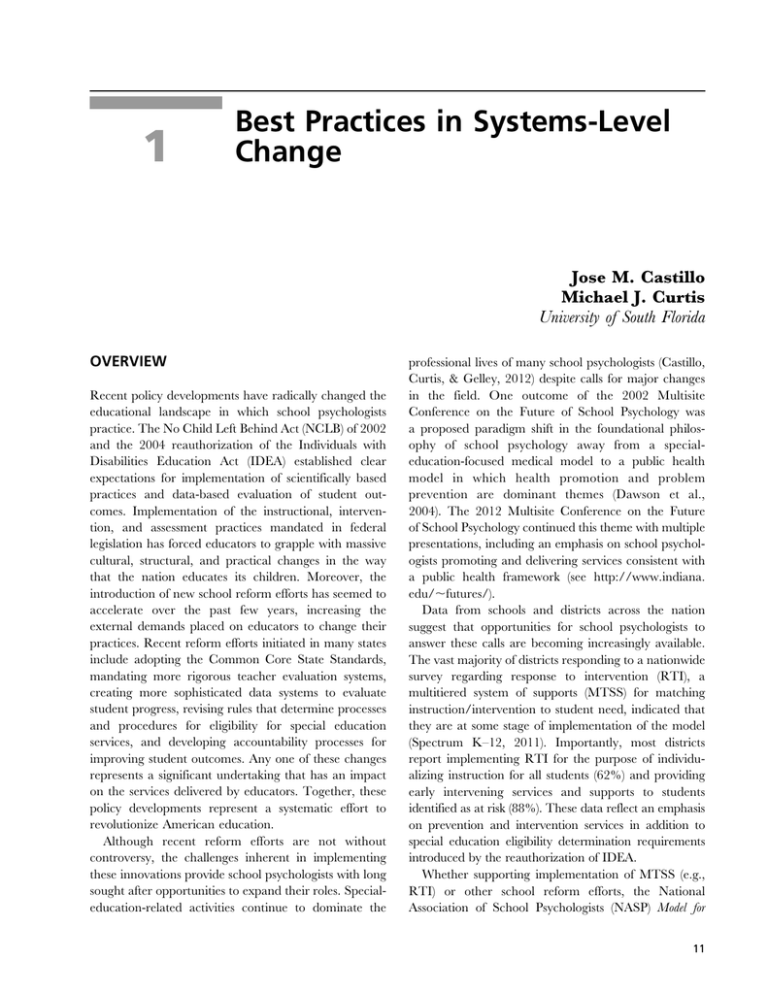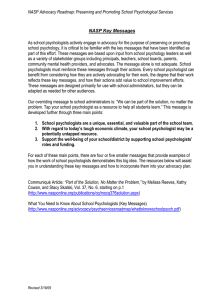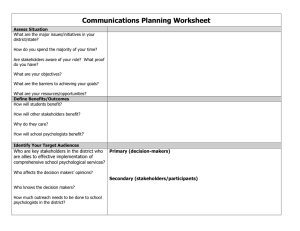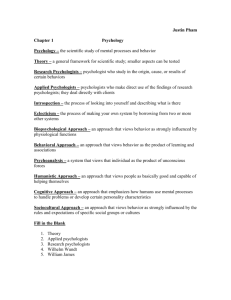1 Best Practices in Systems-Level Change Jose M. Castillo
advertisement

1 Best Practices in Systems-Level Change Jose M. Castillo Michael J. Curtis University of South Florida OVERVIEW Recent policy developments have radically changed the educational landscape in which school psychologists practice. The No Child Left Behind Act (NCLB) of 2002 and the 2004 reauthorization of the Individuals with Disabilities Education Act (IDEA) established clear expectations for implementation of scientifically based practices and data-based evaluation of student outcomes. Implementation of the instructional, intervention, and assessment practices mandated in federal legislation has forced educators to grapple with massive cultural, structural, and practical changes in the way that the nation educates its children. Moreover, the introduction of new school reform efforts has seemed to accelerate over the past few years, increasing the external demands placed on educators to change their practices. Recent reform efforts initiated in many states include adopting the Common Core State Standards, mandating more rigorous teacher evaluation systems, creating more sophisticated data systems to evaluate student progress, revising rules that determine processes and procedures for eligibility for special education services, and developing accountability processes for improving student outcomes. Any one of these changes represents a significant undertaking that has an impact on the services delivered by educators. Together, these policy developments represent a systematic effort to revolutionize American education. Although recent reform efforts are not without controversy, the challenges inherent in implementing these innovations provide school psychologists with long sought after opportunities to expand their roles. Specialeducation-related activities continue to dominate the professional lives of many school psychologists (Castillo, Curtis, & Gelley, 2012) despite calls for major changes in the field. One outcome of the 2002 Multisite Conference on the Future of School Psychology was a proposed paradigm shift in the foundational philosophy of school psychology away from a specialeducation-focused medical model to a public health model in which health promotion and problem prevention are dominant themes (Dawson et al., 2004). The 2012 Multisite Conference on the Future of School Psychology continued this theme with multiple presentations, including an emphasis on school psychologists promoting and delivering services consistent with a public health framework (see http://www.indiana. edu/,futures/). Data from schools and districts across the nation suggest that opportunities for school psychologists to answer these calls are becoming increasingly available. The vast majority of districts responding to a nationwide survey regarding response to intervention (RTI), a multitiered system of supports (MTSS) for matching instruction/intervention to student need, indicated that they are at some stage of implementation of the model (Spectrum K–12, 2011). Importantly, most districts report implementing RTI for the purpose of individualizing instruction for all students (62%) and providing early intervening services and supports to students identified as at risk (88%). These data reflect an emphasis on prevention and intervention services in addition to special education eligibility determination requirements introduced by the reauthorization of IDEA. Whether supporting implementation of MTSS (e.g., RTI) or other school reform efforts, the National Association of School Psychologists (NASP) Model for 11 Best Practices in School Psychology Comprehensive and Integrated School Psychological Services (NASP, 2010a) emphasizes practices that place school psychologists in a position to be leaders in improving the outcomes of students. This chapter, then, focuses on knowledge, skills, and practices that are reflected in the model’s Consultation and Collaboration domain. Specifically, the application of consultation skills at a systems level is discussed. Furthermore, the role of systematic problem solving when engaging in systemslevel consultation is detailed throughout. Critically, school psychologists who engage in collaborative problem solving during systems-level consultation can indirectly facilitate the improved student outcomes that are the focus of educational stakeholders. However, one major obstacle to sustained improvements in student outcomes is a persistent disconnect between our knowledge about what research tells us about effective innovative practices and our knowledge about what research tells us about principles for systems change (Fixsen, Naoom, Blase, Friedman, & Wallace, 2005). In other words, the problem school psychologists face in responding to accountability demands does not lie with the availability of effective practices; rather, it lies with the failure to implement those practices effectively in a specific school setting. However, in almost every case (e.g., positive behavior support at the school level and mental health programs), implementation of the proposed program or practice would represent a significant school-wide change initiative, the success of which would depend on knowledge and skills in systems-level change. The reality is that knowledge and skills relating to both the innovative practice and systems change are essential if we are to be successful in bringing about meaningful change in our schools. It is apparent that there is an overriding need to engage in organizational change through the carefully planned application of systems change principles if school reform is to be successful. Unfortunately, the preparation of most school psychologists has not included knowledge and skills relating to systems change. In fact, the 2010 standards for training programs adopted by NASP (see NASP, 2010b) and guidelines for the provision of school psychological services (see NASP, 2010a) include a focus on systems change for the first time. Nevertheless, the inclusion of systems change in these documents attests to the growing recognition of the importance of this area. In addition, School Psychology: A Blueprint for Training and Practice III (Ysseldyke et al., 2006) places special emphasis on knowledge and skills in understanding and changing systems. 12 As a result of the recent emphasis on systems change, this professional function has not been emphasized by many school psychologists. According to Castillo et al. (2012), the average school psychologist reports spending less than 6% of his or her time engaged in systemsfocused consultation. Nevertheless, it is an area to which many school psychologists could contribute valuable knowledge and expertise. The central foundation of psychology is the understanding of human behavior. A special strength of school psychology is understanding human behavior within the context of schools and educational institutions as they function in relationships with families and the larger community. In other words, school psychologists understand human behavior within the ecology of the school as part of a larger system. This understanding and expertise can allow school psychologists to emerge as leaders in the implementation of changes that are important to educational stakeholders. The purpose of this chapter is to increase school psychologists’ understanding of the knowledge, skills, and practices that facilitate systems change. It is hoped that after reading this chapter, school psychologists will understand schools as complex social systems, understand the role of consultation skills in facilitating systems change, and understand critical systems change principles and their application in school settings. BASIC CONSIDERATIONS There are some circumstances in which a school psychologist might function in the role of a systemslevel change agent from outside the organization (e.g., the school psychologist would be hired for the specific purpose of facilitating systems change). However, in most cases, the school psychologist will be an employee of the school district, typically assigned to serve one or more schools, and facilitating systems change will represent only one of a variety of direct and indirect professional service functions. In order to effectively facilitate systems-level change, school psychologists need to call upon three areas of expertise: N N N An understanding of human behavior from a social systems perspective An ability to use collaborative planning and problemsolving procedures A familiarity with principles for organizational change National Association of School Psychologists







